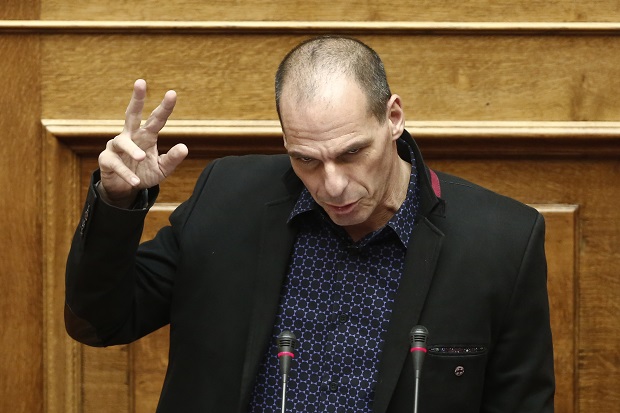
Finance Minister Yanis Varoufakis speaks during a Parliament session in Athens, Monday, Feb. 9, 2015. Varoufakis dismissed the 240 billion euro ($270 billion) bailout packages crafted by Greece’s lenders as a “toxic fantasy” that had always been doomed to fail. AP
ATHENS, Greece — Greece put a brave face on its fraught negotiations with European bailout creditors, with the new prime minister voicing confidence Monday that a compromise can be reached at high-stakes meetings in coming days.
Alexis Tsipras’ comments came as Greek stocks and bonds took a drubbing after the radical left-led government renewed a pledge to seek bailout debt forgiveness and dubbed the country’s rescue package — with its conditions of strict austerity — a “toxic fantasy.”
“I don’t believe there is a serious reason for there not to be an agreement … with our partners — just political reasons,” Tsipras said after a meeting in Vienna with Austrian Chancellor Werner Faymann.
“If we are brought to an impasse due to such political reasons, then I think that would be a decision to torpedo our common European future,” Tsipras added. “And I think nobody harbors such intentions.”
Tsipras’ government won Jan. 25 elections promising relief for Greeks who have suffered through six years of recession and a dramatic drop in living standards. It’s under intense pressure to work out a deal with bailout creditors in coming weeks or days, which would unlock funds and secure cheap financing for Greek banks — five of which suffered a one-notch downgrade Monday by Moody’s ratings agency.
In the radical left Syriza party’s first week in power, Greece has suffered a ratings downgrade and a decision by the European Central Bank not to accept its bonds as collateral for credit to Greek lenders. A flurry of visits to key European partners earned Tsipras’ government little more than expressions of sympathy.
Greece faces a grilling at an emergency meeting of Eurozone finance ministers in Brussels on Wednesday, with fears of a chaotic currency exit returning.
German Chancellor Angela Merkel said Monday that Berlin wants Greece to stay in the Eurozone, but any agreement must be based on existing bailout commitments.
“I think what counts is what Greece will put on the table at (Wednesday’s) meeting or perhaps a few days later,” she said after talks in Washington with President Barack Obama. “I’ve always said I would wait for Greece to come with a sustainable proposal and then we’ll talk about this.”
Tsipras’ government, which ousted the less-confrontational conservatives, argues that Greece’s 320 billion euro ($360 billion) debt will be increasingly unsustainable unless it receives generous repayment relief that would allow its battered economy to recover.
Finance Minister Yanis Varoufakis dismissed the 240 billion euro ($270 billion) bailout packages crafted by Greece’s lenders after the country nearly went bust in 2010 as a “toxic fantasy” that had always been doomed to fail.
“The time has come to say what officials admit when the microphones are turned off and say out in the open. … At some point someone has to say ‘No’ and that role has fallen to us, little Greece,” he told parliament.
Varoufakis said Athens wants a “bridge agreement” that would involve rewriting a third of the country’s reform and austerity commitments, and modest primary surplus targets of 1.5 percent.
A finance ministry official said Athens would seek permission to raise more funds through treasury bill issues, and the European Central Bank to hand over 1.9 billion euros in profits from Greek bond holdings — a provision of the bailout deal.
The official added that Greece would stick by its electoral pledges on reducing the debt and taking immediate relief action for citizens worst-hit by the crisis.
Amid wider European losses, Greek shares closed down 4.75 percent after dropping as much as 6 percent, continuing a negative run. And borrowing rates were back up, a sign investors are more worried about a sovereign default. The yield on the country’s 3-year-bonds spiked above 18 percent.
Markets were hit after Tsipras in his inaugural speech in parliament late Sunday described his election pledge to seek debt restructuring as “irrevocable.”
“(Tsipras) gave a few hints that the reality shock after a week of European meetings has started to reach Athens,” said Christian Schulz, an economist with Berenberg Bank. “But the policy program presented still reads more like a unilateral tearing up of the conditions under which Athens received … aid.”
British Prime Minister David Cameron chaired a meeting of central bank and government finance officials, and later tweeted: “Given uncertainty around Greece and the euro, it was important I chair a meeting to ensure the government is prepared for all eventualities.”
Greece’s Parliament is scheduled to give Tsipras’ coalition a vote of confidence late Tuesday.
RELATED STORIES
Greece anti-bailout party wins; alarms Eurozone, creditors
New Greek gov’t blinks, vows to pay debts